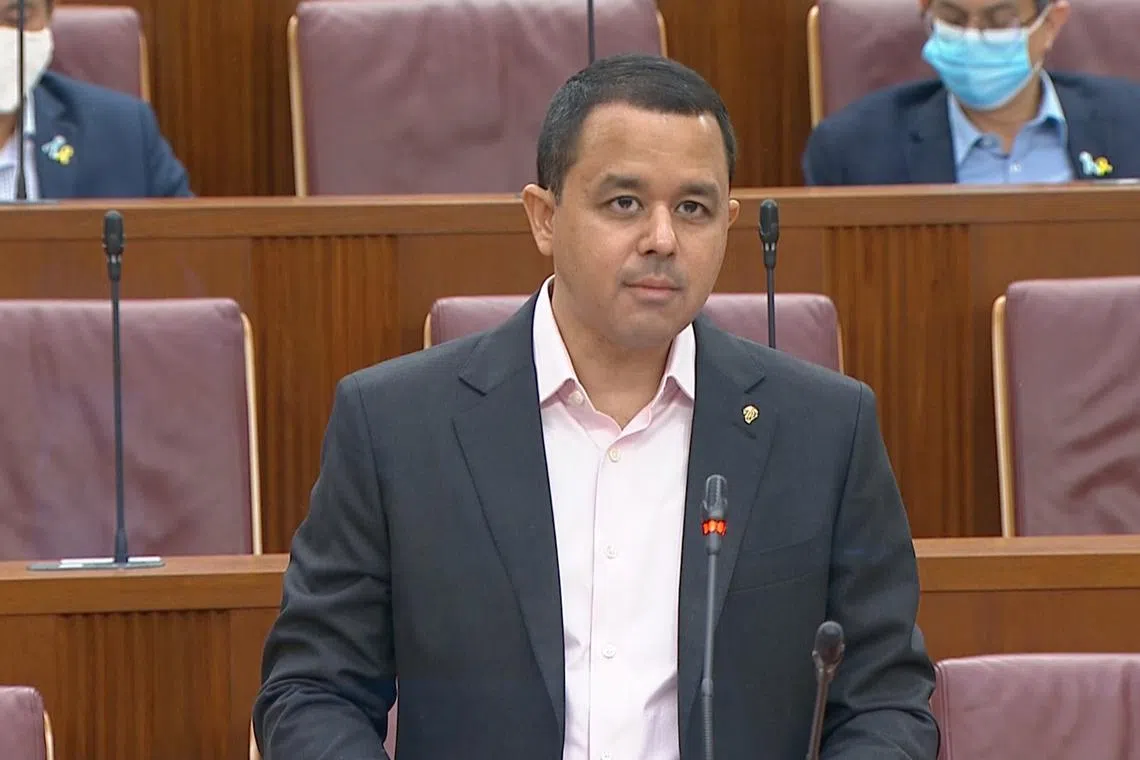MP Christopher de Souza cleared of misconduct as lawyer, says he’s pleased to be vindicated
Sign up now: Get ST's newsletters delivered to your inbox

The decision by the Court of Three Judges came after the Law Society argued for Mr Christopher de Souza to be suspended for 4 years.
PHOTO: GOV.SG
Follow topic:
SINGAPORE - People’s Action Party MP Christopher de Souza was cleared of a charge of professional misconduct as a lawyer on Monday.
The decision by the Court of Three Judges came after the Law Society argued for him to be suspended for four years.
Mr de Souza is the Deputy Speaker of Parliament and an MP for Holland-Bukit Timah GRC.
His lawyer, Senior Counsel Tan Chee Meng, had urged the court to acquit him of the charge, arguing that the Law Society had persistently advanced a doggedly misconceived case against Mr de Souza, a partner at Lee & Lee.
Mr de Souza was found guilty by a two-member disciplinary tribunal in 2022
However, the court, comprising Justices Belinda Ang, Woo Bih Li and Kannan Ramesh, reversed the decision.
The court found that Mr de Souza did not intend to suppress evidence of his client’s breaches, and that he had stuck to his intention to disclose the breaches in the face of a stubborn client.
The tribunal had erred in its analysis, said the court. The court said the tribunal should have, but did not, consider the question of intent, which was necessary to prove the charge against Mr de Souza beyond a reasonable doubt.
Even assuming there was non-disclosure, the Law Society fell short of establishing suppression, said the court.
The law recognises different types of non-disclosure: innocent non-disclosure, negligent non-disclosure and intentional non-disclosure; and it will elaborate on these matters in written grounds at a later date, said the court.
A statement issued through Mr de Souza’s lawyers from WongPartnership after the verdict said he was extremely pleased he had been vindicated after three years.
“The allegations against him for suppression of evidence, as well as the other charges, were totally unfounded,” said the statement.
“He has at all times acted with the utmost integrity, advising the client from the earliest opportunity to seek permission from the court to rectify its earlier breaches of the undertakings. Mr de Souza has always been mindful of his obligations as an officer of the court.”
The case related to Mr de Souza’s conduct while he was acting for Amber Compounding Pharmacy and Amber Laboratories.
Amber, which was initially represented by another law firm, was granted a court order to carry out a search for documents, on condition that it give an undertaking not to use the seized documents without further order.
However, Amber used some documents to lodge reports with various authorities.
Lee & Lee later took over the civil suit, and Mr de Souza advised Amber to apply for the court’s permission to use the documents.
Earlier on Monday, Mr Madan Assomull, representing the Law Society, argued that Mr de Souza knew about the breach but failed to disclose it in the affidavit of a company representative that was filed to support the application.
Mr Assomull argued that there was a deliberate intention to make the affidavit vague. He also argued that Mr de Souza made the considered decision not to exhibit the reports in the affidavit.
Mr Tan argued that the affidavit did reveal that Amber had used the documents. The affidavit by Mr Samuel Sudesh Thaddeus, a representative from Amber, said he had reviewed the seized documents, came to the conclusion that criminal offences were committed and decided to lodge the reports, argued Mr Tan.
During the hearing, Justice Woo commented that the paragraph in question was not worded as clearly as Mr de Souza seemed to think.
The judge said: “I had to read paragraph 24 many times because it’s not as clear as he made it out to be. It’s the way of drafting. I hope your client learns something.”
Mr Tan replied that the affidavit could have been better drafted, but argued that the lack of clarity did not show an intention to assist Amber to suppress evidence.
He said Mr Sudesh’s resistance to disclosure led to a series of e-mail exchanges between the Lee & Lee team and Amber, resulting in seven iterations of the affidavit.
Mr Tan showed an internal e-mail in which Mr de Souza flagged Mr Sudesh’s amendments for giving an incorrect impression.
But Mr Assomull questioned if the court wanted to send the message to lawyers that sometimes they can get away on the basis of bad drafting.


